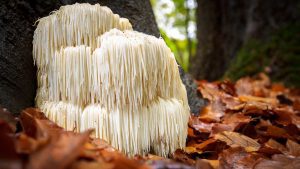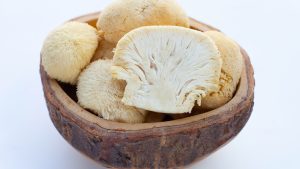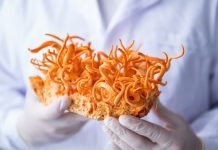
In the world of natural supplements, every so often, a product captures the collective imagination and steadily grows in popularity.
In the UK, amidst the diverse array of cognitive enhancers, Lions Mane has emerged as a stellar contender, occupying a prime position in the wellness limelight.
This unique, cascading white mushroom doesn’t just intrigue with its appearance – it’s renowned for its potential cognitive and neurological benefits, making it a favourite among the British.
But what is the secret behind the meteoric rise of this white mushroom in the UK’s nootropic mushroom market? Let’s dive in to unravel this phenomenon.
The popularity of Lions Mane in the UK and globally
The global fascination with Lions Mane is undeniable, and in the UK, its charm seems to multiply.
A slew of research underscoring its cognitive and neurological virtues, combined with the nation’s fast-paced lifestyle, has made it an appealing choice.
As the natural cognitive enhancers market expands, Lions Mane has solidified its status as the top choice in the UK.
Research to support the use of nootropic mushrooms for various health conditions
Modern science has offered robust support to the age-old tales of Lions Mane’s health benefits. A notable study by Mori et al. demonstrated its potential in amplifying nerve growth factor synthesis in nerve cells, vital for cognitive function.

Furthermore, research has illuminated its potential in combating mild cognitive impairment.
Moreover, studies are ongoing to understand its role in fighting depression and anxiety, and the preliminary results have been promising.
With each research paper, the credence to Lions Mane’s health benefits grows, further fuelling its popularity in the UK and beyond.
Spotlight on a prime product: Lions Mane drops
While there are numerous ways to consume Lions Mane, one product that stands out for its potency and convenience is the Lions Mane Drops available on Dr Mush Me’s online store.
Crafted using state-of-the-art extraction methods, these drops represent a hassle-free approach to incorporating them into a routine.
A few drops under the tongue or mixed in a drink, and you’re all set to embrace the potential cognitive benefits of this magical mushroom.
Why use ultrasonic-assisted extraction for nootropics?
Harnessing the best of modern technology, Ultrasonic Assisted Extraction (UAE) stands out as an innovative approach to the extraction process. The application of ultrasonic waves ensures that the highest amount of bioactive compounds are harvested from the mushroom.
This is particularly beneficial for nootropics, as the technique amplifies purity, heightens bioavailability, and guarantees that consumers, like those purchasing from Dr Mush Me’s collection, get optimal benefits.
Nootropics: Nature’s cognitive boosters vs man-made enhancers
The world of cognitive enhancement has seen an exciting surge in interest, thanks largely to nootropics. But what are these so-called ‘smart drugs’? What forms do they come in, and how do they help boost brain function?
Spotlight on nootropics
Derived from the Greek words ‘nous’ meaning ‘mind’ and ‘tropos’ meaning ‘turning’, nootropics are compounds that have the potential to enhance cognitive function, memory, creativity, and even motivation in healthy individuals.
Since their introduction, they have been widely adopted by students, professionals, and anyone looking for a mental edge.
Common nootropics: From the natural world to the lab
Natural nootropics
- Coffee: Arguably the most consumed nootropic globally, caffeine, primarily found in coffee, stimulates the central nervous system, enhancing alertness and reducing the perception of fatigue.
- Lions Mane Mushroom: Apart from its unique appearance, Lions Mane has been studied for its potential neuroprotective properties and its ability to stimulate nerve growth factors.
- Ginkgo Biloba: Used for centuries in traditional medicine, Ginkgo is believed to boost memory and cognitive speed.
- L-Theanine: Found predominantly in tea leaves, L-Theanine is known for its calming effects, often counterbalancing the stimulating effects of caffeine.
- Rhodiola Rosea: An adaptogen that is believed to help the body adapt to stress, and enhance energy, stamina, and mental capacity.
Synthetic/man-made nootropics
- Modafinil: Originally developed as a treatment for narcolepsy, it’s now widely used off-label as a cognitive enhancer.
- Adderall: While prescribed for ADHD, it’s often used off-label for its focus-enhancing properties. It should be noted that misuse can lead to severe side effects and dependency.
- Racetams: This class of drugs, including Piracetam, Aniracetam, and Phenylpiracetam, is believed to enhance memory, cognition, and mood.
- Noopept: Often touted as being more potent than Piracetam, it’s believed to offer cognitive benefits, though more research is required.
Natural vs synthetic: Which to choose?
While both natural and synthetic nootropics can offer cognitive benefits, the decision on which to use often boils down to personal preference, desired effects, and risk tolerance.
Natural nootropics tend to have a longer history of use, and their effects are often gentler and more holistic. On the other hand, synthetic nootropics can offer pronounced and specific cognitive benefits but come with a risk of side effects, especially if misused or taken without a prescription.
It’s imperative to consult with a healthcare provider before diving into the world of nootropics, especially if considering synthetic ones or if one has underlying health conditions.
The history of Lions Mane
The annals of traditional Chinese medicine have mentions of the revered Lions Mane mushroom. Its myriad health benefits made it a staple in ancient wellness practices.

As the West began to explore Eastern traditions, Lions Mane found a new home and audience, leading to its present exalted status.
Online shopping: The contemporary way to purchase Lions Mane
The digital realm offers unparalleled convenience, variety, and access to a treasure trove of information, making online shopping the go-to method for many.
Platforms like Dr Mush Me not only provide superior quality products but also furnish consumers with ample information, fostering informed choices.
The British affinity for nootropic mushrooms
The spotlight on Lions Mane in the UK is not mere happenstance. Its rich history, modern scientific backing, and diverse consumption methods make it a standout.
As the UK’s health consciousness journey progresses, it’s evident that Lions Mane will be at the forefront of the nootropic domain.
References
- Mori K, et al. Improving effects of the mushroom Yamabushitake (Hericium erinaceus) on mild cognitive impairment: a double-blind placebo-controlled clinical trial. Phytother Res. 2009.
- Nagano M, et al. Reduction of depression and anxiety by 4 weeks Hericium erinaceus intake. Biomedical Research. 2010.
- Lai PL, Naidu M, Sabaratnam V, et al. Neurotrophic properties of the Lion’s mane medicinal mushroom, Hericium erinaceus (Higher Basidiomycetes) from Malaysia. International Journal of Medicinal Mushrooms. 2013.
- The World of British Fungi
- National Center for Complementary and Integrative Health (NCCIH) – Hericium erinaceus
- Giurgea, C. E. (1972). The “nootropic” approach to the pharmacology of the integrative activity of the brain. Conditional Reflex, 7(2), 108-115.
- Wilens, T. E., Adler, L. A., Adams, J., et al. (2008). Misuse and diversion of stimulants prescribed for ADHD: A systematic review of the literature. Journal of the American Academy of Child & Adolescent Psychiatry, 47(1), 21-31.


















